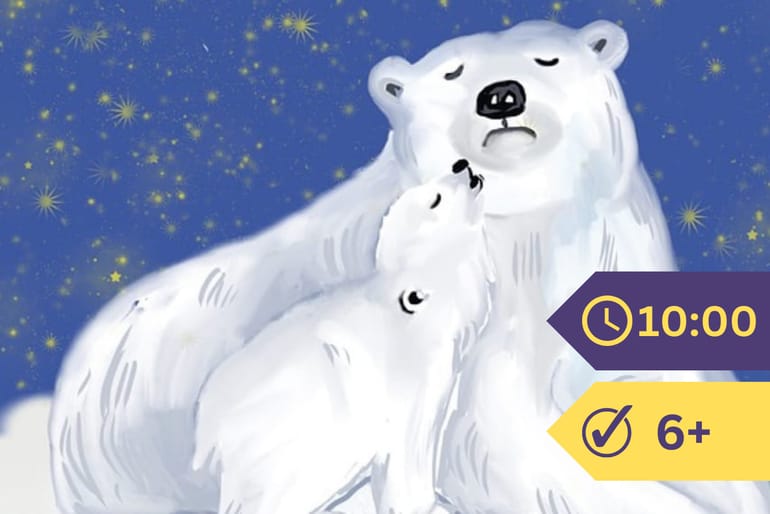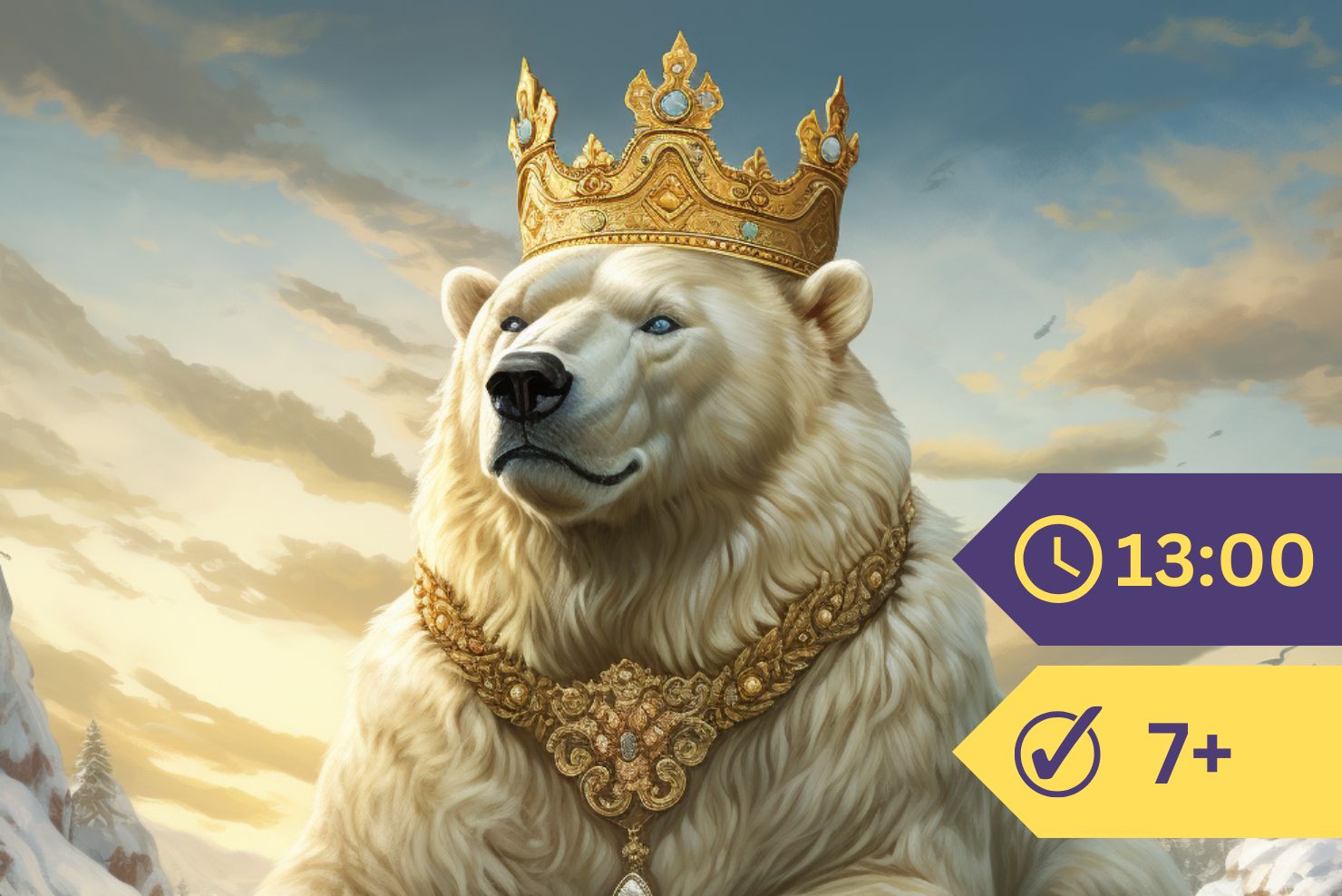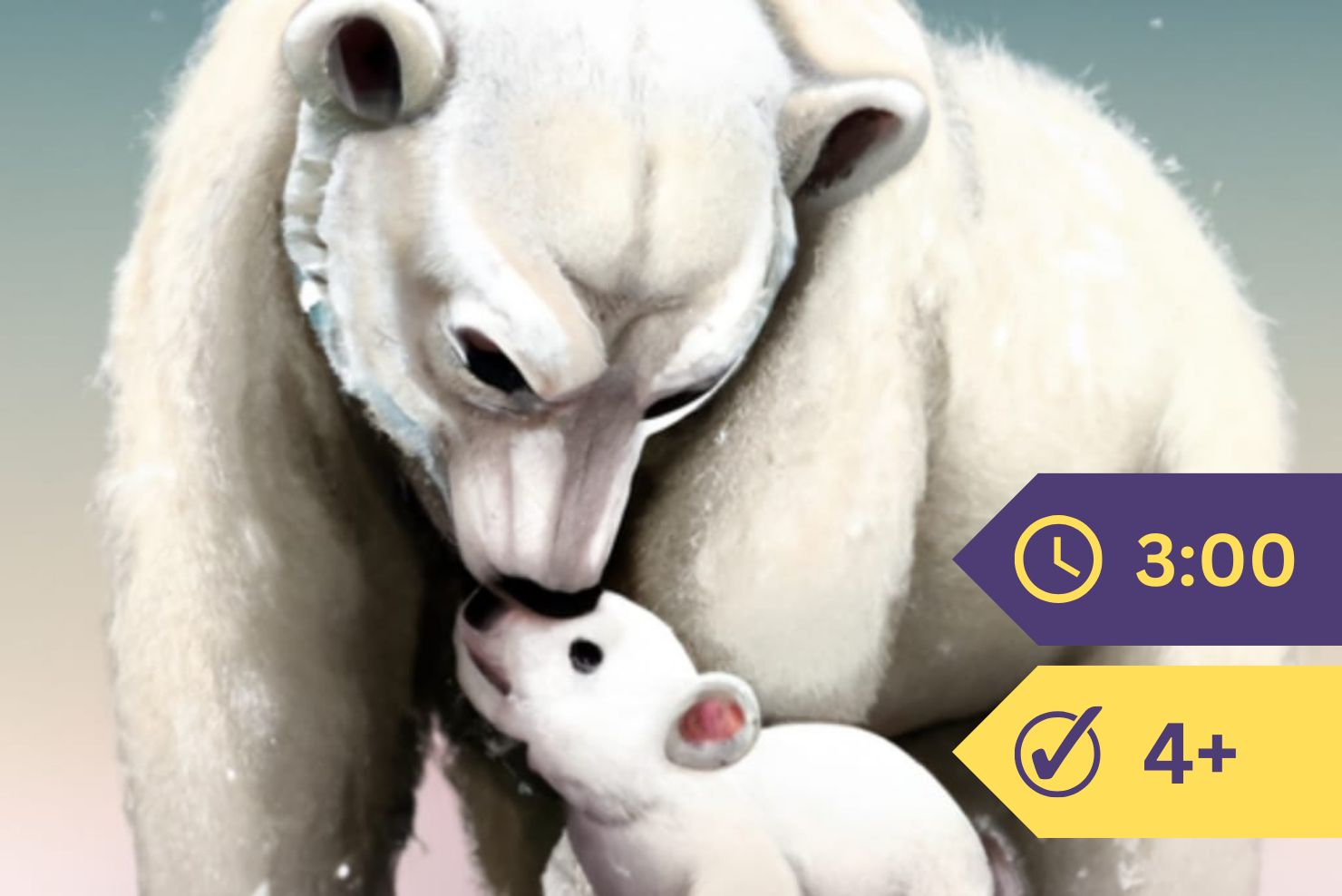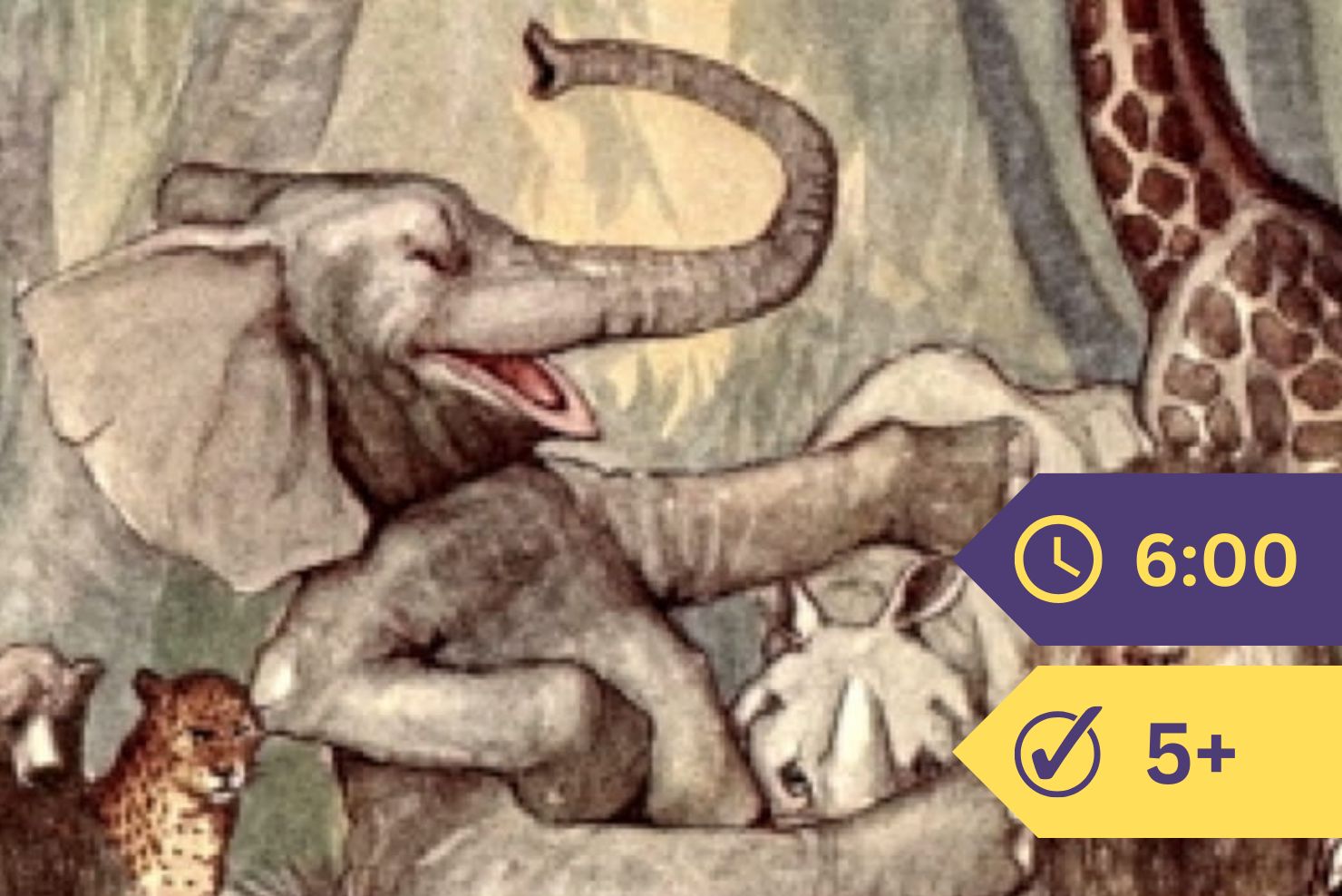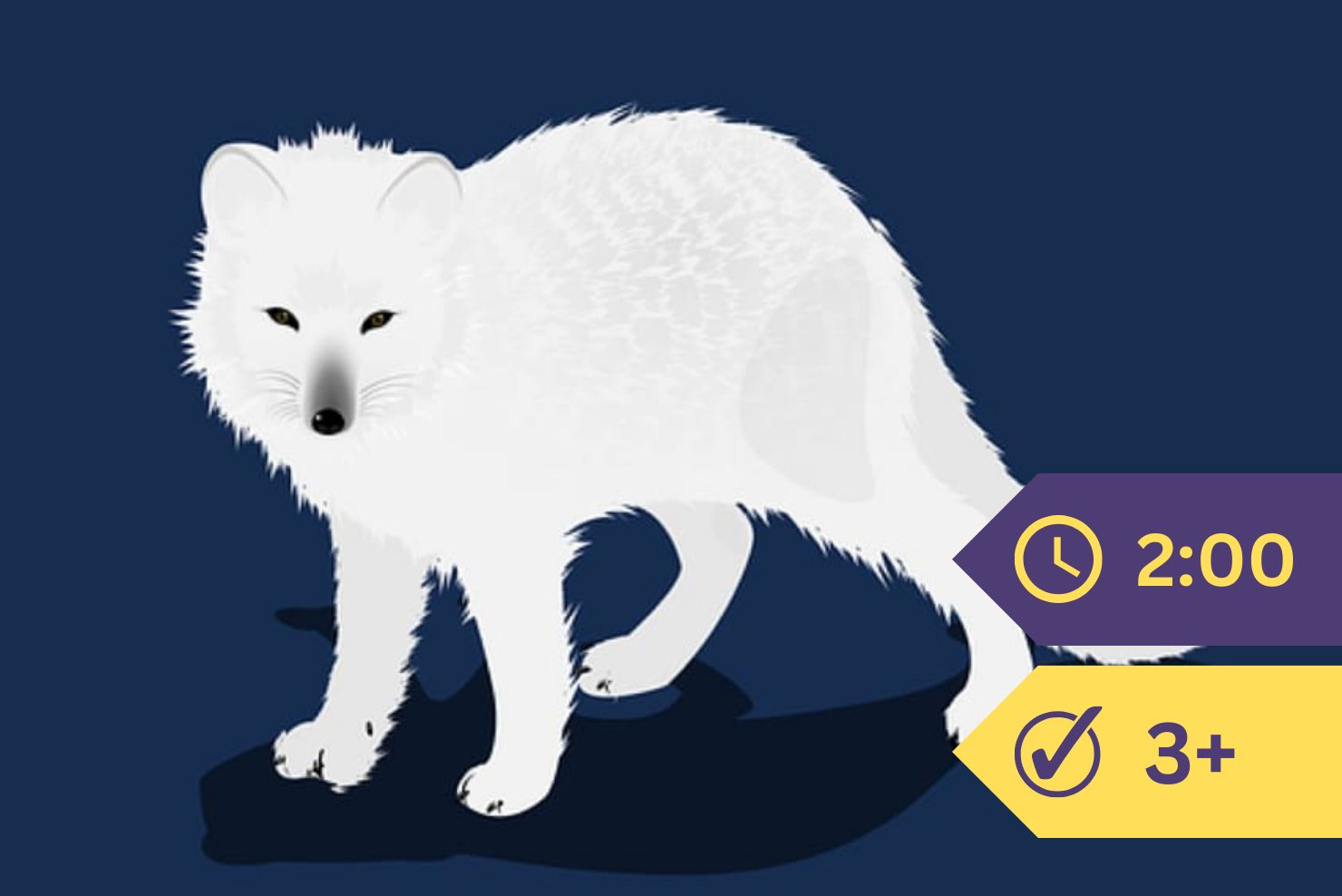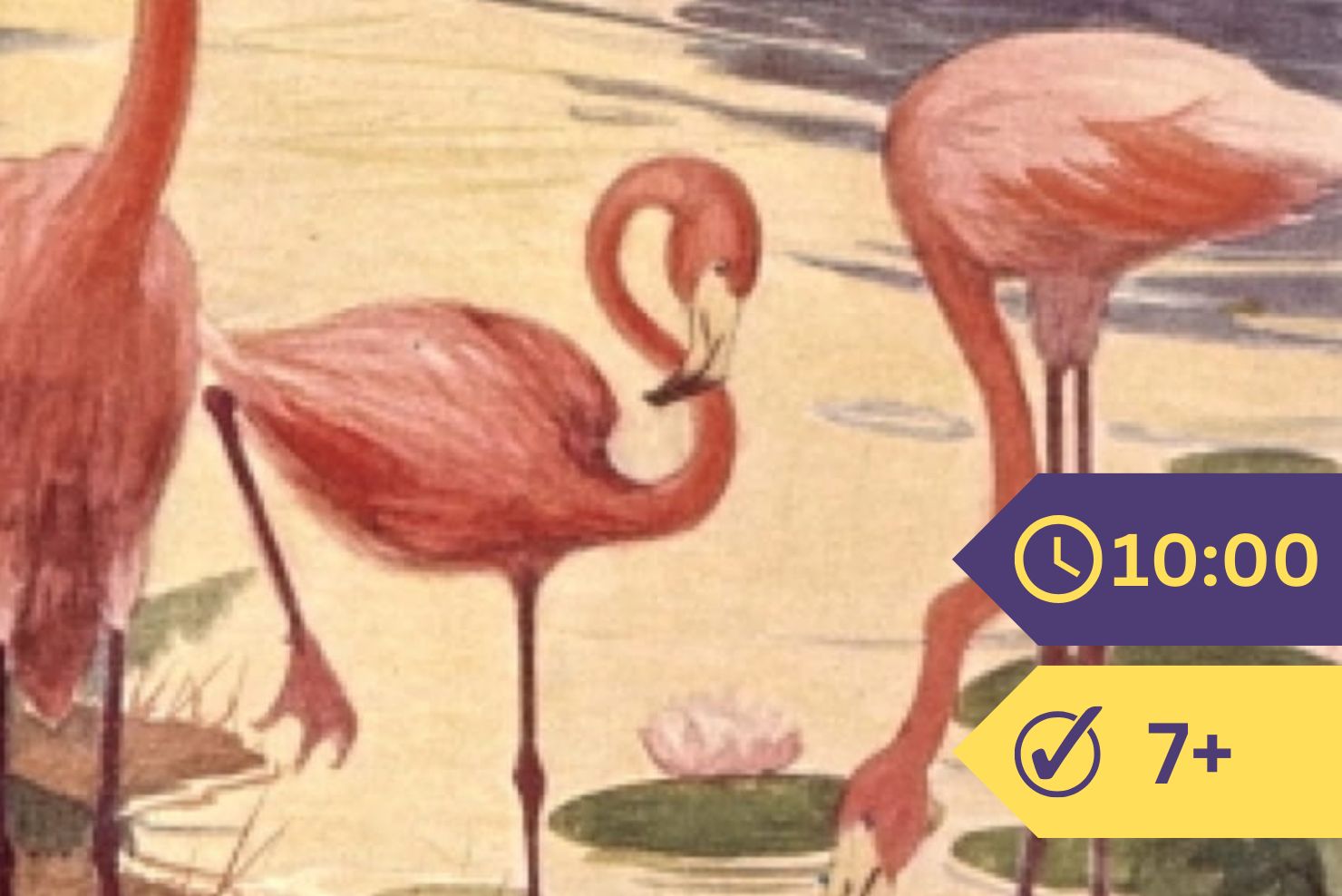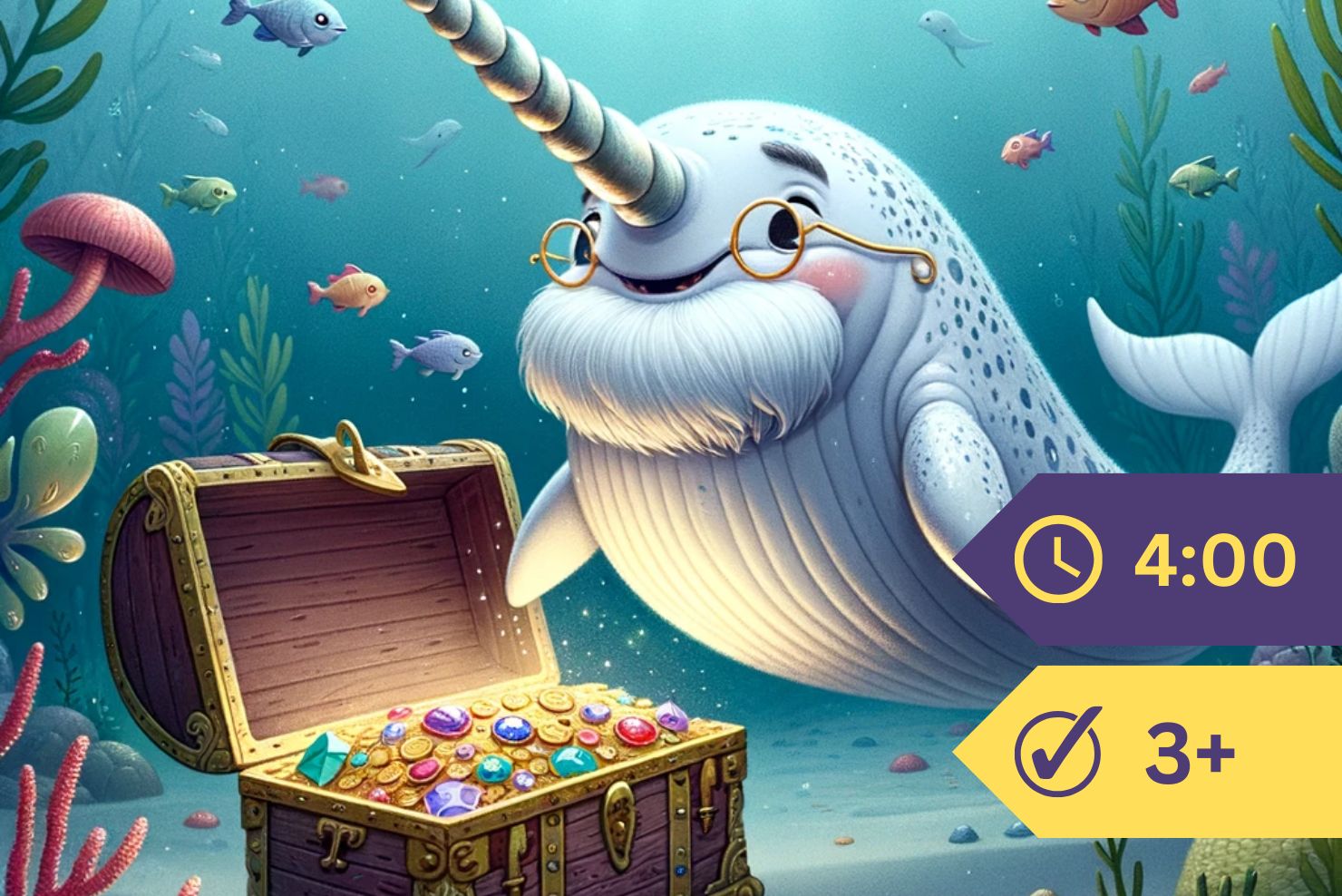The long, dark winter was on the wane. Months of cold starlight and terrific winds, with numberless storms of heavy snow, had gone by. Little by little the streak of light on the horizon, the thin shadows which it cast over the snowfields, and the gentler quality of the air increased; so that every one who lived in this far Arctic region stirred in his winter sleep and there was preparation for a short and very busy summer.
Some of the animals had been abroad, indeed, throughout the whole dark night of the polar winter; such of them for instance as the lovely white fox and the great polar bear. For it was not their custom to crawl away, as many did, into the deep snow-banks, there to sleep it out; for they knew that even this season of blackness and appalling cold had plenty of food for them, and they were always insatiably hungry.
But Mr. Bear’s wife was of a different turn of mind, and although she knew that her husband would not provide for her quite as she would like to be fed, she was willing to go deep into the snow and dig out for herself a warm bed away beneath the surface. There she had stayed, never so much as venturing to the opening after the real night had set in.
And there her cubs were born. Two of them there were. The good Mrs. Bear was so delighted with their beauty that she was impatient for the warm days to come when she could take them out and show them to her relatives and friends.
“Perhaps, too, their father will be back by the time summer comes,” she thought.
And then she was suddenly glad that he was not around just now; for he was very quick-tempered, and if the babies annoyed him at all, he would be pretty sure to cuff them. And one blow of Mr. Bear’s paw would finish the career of any baby bear in the world.
So the two little creatures, clad in the whitest of fur from head to foot, their claws as black as ebony, and their wide eyes as yellow as amber, lay snuggled against the great warm body of their mother for all the weeks of the departing winter.
Suddenly, as they rolled over and looked upward through the snow cavern, they saw for the first time what seemed to them a great big eye staring down at them.
“That’s only the hole in the roof,” Mrs. Bear explained. “And pretty soon you will see that it is all blue and beautiful above that window—and then we will go out and away.”
What that meant they did not know; for life so far as they had known it consisted of meals and sleep and endless playtime on the icy floor of their cavern. But they were to know more about it very soon. A white wing flashed by one morning, and a land voice called down the depths of their cave.
It was Mr. Burgomaster, the good-natured gull. He had come purposely to call on Mrs. Bear, for he had two stirring pieces of information to give her.
He perched by the edge of her skylight, and wasted no words in relating the news.
“There’s a whale being driven ashore; and the mists have hidden the birds.”
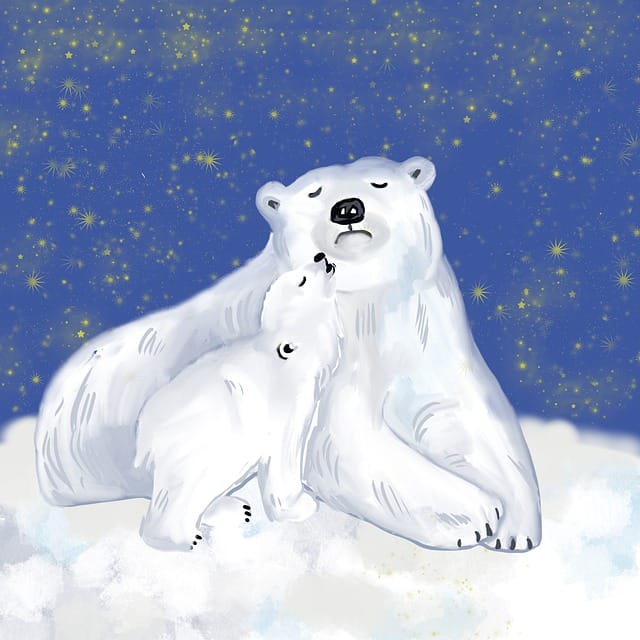
He was gone before Mrs. Bear could so much as thank him for coming; and she was, indeed, deeply obliged. No one but good Mr. Burgomaster would ever have taken such pains.
What he said sounded strange enough, but it meant everything to Mrs. Bear. When a whale was disabled in the far depths of the sea, or had been caught in the currents and gales in such a way that he must surely drift to shore, he was as good as dead and devoured. For in shallow water he would be helpless and once his enormous bulk was stranded on the rocks or the jagged capes of ice he could only give himself up to his enemies.
Mrs. Bear, however, would have been very cautious about venturing to the scene of the banquet, if the great flocks of birds, which were sure to be on hand, were not hidden from view as they hovered above it. Clouds of excited gulls that came nearer and nearer to the shore were a signal of what was about to happen. And the bears, the foxes, and the wolves were not the only ones who knew it. Men, with their ferocious packs of dogs, their long lassos of walrus hide, and their terrible spears, knew well enough what the noisy birds were announcing.
But all would be well if the fogs hung low, and the gathering flocks of sea-birds were thereby hidden.
Mrs. Bear explained the situation to her cubs.
“Of course, your mother would not have built her nursery here,” she ended, “if she thought those terrible creatures with the wolfish dogs and the ropes were within miles and miles of the spot. But you can never tell when they may turn up. They come with their dogs over endless tracks of snow and ice to find us, and they travel fast. You must lie as quietly as you can while I am gone. Amuse yourselves in only the quietest way. Don’t call out at all; and go to sleep again, like good children.”
With that Mrs. Bear rose to her hind feet and reached upward along the snow walls of her house. Then, balancing herself on a ridge of the ice which was for all the world like a side shelf, she made a ponderous leap through the opening into broad daylight. For at last it was the real day, and a glorious glimmer of sunlight behind the fogs showed that summer was coming.
It was good to breathe the free air, and Mrs. Bear shook herself violently to straighten out the creases of her heavy coat. She would have liked to roar, loud and long, but she was trained by experience never to speak in a fog.
“You can’t tell who’s hearing you,” her own mother used to say.
So she only trundled her mighty bulk downward across the ice and snow, to its very edge, where it suddenly broke off and formed an embankment. Below this there was a narrow beach, or what appeared to be one—a strip of confused and tumbled blocks of ice and jagged rocks.
There was a sudden whizzing of wings above her head, and the wailing cries of a hundred little gulls and the many crowds of birds that were hurrying to eat of whale fat. Mrs. Bear broke off in their direction; and soon the sound of snarling voices, the yelps of the quarrelsome foxes, and the vicious bark of the wolves met her ears. Yes, she was none too early, for evidently the assemblage of animals, all as famished as herself, were fighting over the repast.
They were not so polite to Mrs. Bear as they might have been, for they begrudged her any share of the whale’s body. But she paid little attention to any one, and went to work lustily on her first meal of the season.
After the first mouthfuls, however, she felt wonderfully good-humored; for such is the effect of a meal, and it is pleasant to stop and talk a bit when you know there is more to follow.
“I must thank you, Mr. Burgomaster,” was her first remark. “You were kind to call me in time. This is a good beginning to the summer.”
The white-winged gull, largest of all the birds that were present, and by far the best mannered, only begged Mrs. Bear to remember that they had been friends for many years.
“And I propose to name my children,” Mrs. Bear announced, as this delicious dinner began to increase her fine spirits, “I propose to name the babies after you and your wife: Odin and Olga. That’s what they shall be.”
Mr. Burgomaster was at a loss how to express his gratitude for this compliment. But he needed to say little, for such a generous tribute is not repaid in words.
Something he said later on, however, in which he quoted Dr. Penguin, brought forth her assent on the subject of eating too much, for she added, “True, true, it is not wise to overeat at your first meal of the year. A relative of mine did that once, and was unable to climb over the path to his door.”
So, taking as goodly an amount of provender with her as she could carry away, Mrs. Bear went home to feed her babies. They were far more interested in this new and appetizing breakfast than in the names which she gave them, you may be sure; and from then until the whale was used up and only his bones were left to dry in the winds, Mrs. Bear was continually carrying meals to her cave.
By this time the winter was gone, and the roof of the snowhouse fell in. The melting drifts drenched every ledge and cranny of their home, and it was time to be wandering.
“You must do exactly as I tell you,” Mrs. Bear kept saying, “and you must never stray from me a minute. For we are going to start on our journey, and there will be a great many dangers to guard against.”
When little Odin and Olga trotted along beside their mother, with the whole world before them, and a keen appetite with them, they were as alert and excited as any two bears in the world could be.
The great rolling, blue water, the ice that floated on its surface and shone like white ivory in the sun, the patches of green grass on the sides of the hills, and the rocks black with snow water, made a dazzling scene.
Their long day began with a wonderful feat on the part of Mother Bear. After they had swum to a low, wide ice floe, which was a little way from shore, and Odin and Olga were just learning to use the hairy pads of their feet in climbing the sides of the small iceberg, Mrs. Bear gave a sudden plunge into the water, and disappeared from view. She swam far out, her nose barely coming to the surface, and the rest of her body entirely concealed. Then, rising to the surface, she brought back with her a huge fish which she had stunned with a blow of her mighty paw.
“It’s all in the way you slide into the water,” she said; and then, as they ate greedily of this morsel, she told them of diving for sea-lions and of capturing them by coming up from under the prey.
“You will swim under water great distances, as soon as you learn to hunt,” she said, “and you will learn to make no noise about it.”
This was the truth, as not only the seals and the sea-lions, but plenty of the great fish, could bear witness.
But, as events of the day were to turn, little Odin and Olga were near to never growing up at all; for the very danger which their mother most dreaded was speedily approaching. While they were playing first on the ice cakes and then on the shore, and Mrs. Bear had about made up her mind that they would stay that night at a point not far distant, where she saw many sea-birds fluttering, and where, she reasoned, the fishing and seal hunting might be good, the hunters with their trained dogs were fast approaching the very spot.
For your Eskimos have their own way of reading the signs; and as many birds had been flocking in this direction, the men had steadily pursued the trail. Day after day they had traveled, and they felt sure that they were coming upon at least a herd of seals or of walruses. And they hoped, of course, to bag a great white bear.
But Odin’s mother had assured herself that there was no danger, or it would have been revealed during the time that the whale had attracted such crowds of her brother animals. She did not perceive that her enemies knew exactly how prone the well-fed bear is to linger near the spot of her recent feedings.
“That is just the place to spend the night, out there,” she said; “for on those points that reach out into the sea, you can escape by land or by water, as you have to. Remember that, too, children.”
Little Olga stopped to rub her head at this. She was trying to remember so many things! Mrs. Bear told her it was nothing, and that learning things was the whole of life anyway.
When Mrs. Bear and her twins reached the icy point, there were the friendly Penguins to meet them and to exclaim over the children. They were having a fine visit when suddenly a dull roar far below them on the shore made every one sit up and listen.
It came again and lasted longer. It was a new sound to the children, but Mrs. Bear recognized it.
“That’s an iceberg breaking up,” she said at last. “Not a pleasing sound, but one you’ll soon get used to.”
Night came and they curled up, all three, in a snug corner under the ice shelves of the point. The wind was high and the sea was noisy, but they were too well tucked away to care.
And they little dreamed of what was going on around them.
For scarcely had the sun gone down, when the Eskimos with their teams of wolfish dogs were on the spot. Little by little they had crept to the end of the point, and one by one they stationed themselves at intervals to wait, like so many sentinels, for the morning.
Mrs. Bear would never reach the water alive; and escape back to the mainland was impossible. There were enough dogs and men on hand to cover the avenues of escape.
Before little Odin and Olga were awake sufficiently to see anything at all, Mrs. Bear had faced her first ambushed enemies. From where the cubs cowered in their corner, they saw their mother rear on her hind legs and then drop with a terrible force, hitting the dogs right and left as she landed among them. There were thunderous noises, and her own mighty roars were almost drowned by the snarling of the dogs and the shouting of the men, who were fast closing in. She was bleeding already and several of the dogs were lying dead around her.
Mrs. Bear stood truly at bay. One man, more courageous than the rest, came running up with his pointed spear, ready to take aim. A terrific noise arrested him—a noise in which all else was nothing. The land seemed to reel and topple; the great ice shelves came crashing down.
Men and dogs ran for their lives; and to save themselves they plunged bodily into the sea. For the whole point of ice had broken from the mainland and, like a ship that is rocking and righting itself, it was sending up mighty waves and eddies on every side.
The motions were less gigantic after a while, and the new iceberg had found itself. Already it was moving forward, and the wind was driving it foot by foot into the outgoing tide.
Mrs. Bear knew precisely what to do. Twice in her life she had traveled on ice floes, though never on so large a one as this.
“Here we are, and here we stay,” she said. “By and by we’ll come to islands, or so close to shore that we can swim back to land. It will be a long time before we are carried out beyond this gulf, and we’re sure to escape before then.”
She was a little too cheerful, perhaps, for some of her own kin had gone that way so far into the great southerly current that they were never seen again. But Mrs. Bear was one of those happy beings who always look for the best, not the worst; and she was too joyous over this sudden deliverance to heed any new perplexity.
Long weeks afterward, when Mother Bear’s wounds were healed, and Odin and Olga had indeed learned how to live by diving and hunting under water, they came to a narrow bay where the land was green on both sides. The distance from their iceberg was but little; and they plunged in, while Mr. Burgomaster circled over them excitedly. He was a wonderful mariner, Mr. Burgomaster, and, being such a good friend, he had flown back and forth over land and sea, following them on their icy ship.
“You’ll know where you are, Mrs. Bear, when this fog lifts,” he said. “You will find that you have come to a beautiful shore where there are berries and all kinds of refreshing things that bears like. It was a good day that the iceberg started you on your trip.”
“All things, Mr. Burgomaster,” said wonderful Mother Bear, as she crawled out of the water and shook her shaggy fur, “all things happen for the best!”

